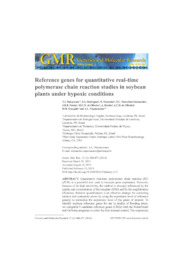Reference genes for quantitative real-time polymerase chain reaction studies in soybean plants under hypoxic conditions.
Reference genes for quantitative real-time polymerase chain reaction studies in soybean plants under hypoxic conditions.
Author(s): NAKAYAMA, T. J.; RODRIGUES, F. A.; NEUMAIER, N.; MARCELINO-GUIMARÃES, F. C.; FARIAS, J. R. B.; OLIVEIRA, M. C. N. de; BORÉM, A.; OLIVEIRA, A. C. B. de; EMYGDIO, B. M.; NEPOMUCENO, A. L.
Summary: Quantitative real-time polymerase chain reaction (RT-qPCR) is a powerful tool used to measure gene expression. However, because of its high sensitivity, the method is strongly influenced by the quality and concentration of the template cDNA and by the amplification efficiency. Relative quantification is an effective strategy for correcting random and systematic errors by using the expression level of reference gene(s) to normalize the expression level of the genes of interest. To identify soybean reference genes for use in studies of flooding stress, we compared 5 candidate reference genes (CRGs) with the NormFinder and GeNorm programs to select the best internal control. The expression stability of the CRGs was evaluated in root tissues from soybean plants subjected to hypoxic conditions. Elongation factor 1-beta and actin-11 were identified as the most appropriate genes for RT-qPCR normalization by both the NormFinder and GeNorm analyses. The expression profiles of the genes for alcohol dehydrogenase 1, sucrose synthase 4, and ascorbate peroxidase 2 were analyzed by comparing different normalizing combinations (including no normalization) of the selected reference genes. Here, we have identified potential genes for use as references for RT-qPCR normalization in experiments with soybean roots growing in O2-depleted environments, such as flooding-stressed plants.
Publication year: 2014
Types of publication: Journal article
Unit: Embrapa Soybean
Observation
Some of Embrapa's publications are published as ePub files. To read them, use or download one of the following free software options to your computer or mobile device. Android: Google Play Books; IOS: iBooks; Windows and Linux: Calibre.
Access other publications
Access the Agricultural Research Database (BDPA) to consult Embrapa's full library collection and records.
Visit Embrapa Bookstore to purchase books and other publications sold by Embrapa.

